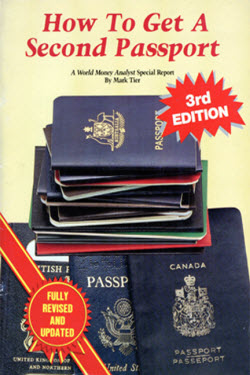Chapter 3
Do You Need A Lawyer?

The major advantages of employing a lawyer or other immigration adviser are:
- Relieving yourself of the paperwork and similar chores;
- assistance in guiding your application through the bureaucracy of the authorities involved;
- through his expert advice being aware of the nuances of the law that you might not recognise — or even be aware exist — and then either exploit or overcome them;
- structuring your application in such a way as to enhance its chances of success.
Whether you need an adviser depends on the country to which you are going to apply, and the category into which your application falls.
If your case is fairly straightforward, such as one occurring through marriage, being sponsored by relatives, or using the needed skills route under an established program, where the procedures of the appropriate consular service are well-settled, you may not need an adviser. If you are applying via the business or investment route, or planning to spend a significant amount of money, you probably ought to engage an adviser.
There are two cases where in my view you should definitely be professionally advised:
Residency in Canada via investment/business.
This is because a business proposal that might be rejected in Vancouver could well be accepted in some other part of Canada. The function of the adviser is to identify, through his knowledge and connections, the place in Canada where your business proposal is most likely to be accepted, and to advise you upon the different kinds of business proposals likely to be welcomed in the different places.
You may also need advice on whether the investment proposal is sensible. For these reasons a law firm or similar professional firm with experience in this kind of work and contacts in the different parts of Canada can provide you with the essential knowledge you are unlikely to have about your proposed country of adoption.
The same can probably be said about a business/investment proposal for Australia, where the different states have different needs and preferences.
In any event, if you are not familiar with the country or with its ways of doing business or the requirements of its bureaucracy, a local adviser can make all the difference.
Dealing with the US
A lawyer specialising in US immigration once showed me the law: six loose-leaf volumes, each about three inches thick — with no index.
On top of that there are case law, precedent, practice, and many nuances. No single person actually knows what the US immigration law is, or means. So in effect, though not by design, there is an enormous amount of discretion in the hands of the US embassy or consulate, through possible differences of interpretation.
A lawyer can do the following on your behalf:
- help you to present your case correctly;
- lend some professional authority to your position in representing you in discussions with the consular officials. A good lawyer should know more about the immigration law than the officials he is dealing with. He’ll be able to point out to them that under the umpteenth sub-paragraph of the nth paragraph in Chapter X of Volume Five, there is provision that lets you in which has not been fully considered by the officials. He may be able to make an ambiguity in the law work to your advantage. If you are on your own without the benefit of such knowledge, you may be lost;
- guide you in constructing the best approach; advise which visa classification gives the best chance of eventually obtaining citizenship; and provide a long- term plan to enable you to turn a temporary work permit into permanent residency and citizenship.
Buyer beware
As in any other business, there are unscrupulous people about who offer their services as immigration consultants, or tell you that they can guarantee you a passport if only you buy some piece of property or other investment that they are trying to sell.
No-one can issue a passport except a government; no-one except the duly authorised officials of the government can officially approve any application, and not even a consular or embassy official can guarantee the success of your application.
A friend of mine was once approached by a person purporting to sell Canadian passports. For a fee of $C25,000 this man would be willing to make the application on my friend’s behalf. $C15,000 was to be paid up front, the balance if the application succeeded. I happen to know a highly reputable firm of Canadian lawyers whose normal fee is under $C15,000 for this work, including most of the work of framing and submitting the business proposal, and they claim never to have had a failure. There is a big difference between professional service for $C15,000 and someone who might simply pocket your $C15,000 and later say — if you ever saw him again — that he was sorry your application failed.
Places like Hong Kong, South Africa, the Middle East and Taiwan attract charlatans by the jumbo-jet-load.
Caveat emptor: let the buyer beware. Before you engage an adviser or pay any money, ensure that you are satisfied he knows what he is talking about and can deliver what he promises — though one thing he cannot promise is the success of your application. Interview him thoroughly, and seek references from satisfied customers who have used his services. A good lawyer will not, of course, reveal their names to you without their consent. But if he has done a good job for them, there must be some who would authorise him to give you their names, or at his request made with your authority, give you a call.
Also seek references from the embassy or consular service that he will be dealing with on your behalf, and from professional colleagues or organizations in his locality.
Do not rely on a large well-known firm just because it is large and well- known: it may be the best law firm in the world at everything but the specialised job you want done. And do not rule out a one-man band: he may be just the expert you are looking for.
Hong Kong residents in need of assistance have access to the services of Hong Kong Freedom of Movement & Rights of Abode Limited. It is not a law firm, though it was founded by Mr. T.S. Lo, who is a lawyer as well as a former senior appointed member of Hong Kong’s Legislative Council.
The company, which was set up as a non-profitmaking entity, opened its office in early 1985, and by the end of 1987 had advised some 3,000 Hong Kong residents on emigration questions.
Hong Kong residents may find this by far the least expensive source of advice available to them, at least in the first instance. To register with the company as a client costs a mere $HK500.
Its office is at Room 1512 C.C.Wu Building, 302-308 Hennessy Road, Wanchai Phone: 5-8912618.

